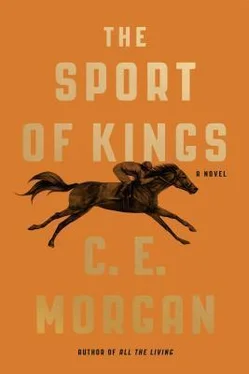Now the preacher looked gently but firmly at Henry, then at Judith, allowing them to shelter under his gaze. “So Judith and Henry, in the presence of Christ’s community, how do we begin to cope with the death of a beloved daughter? We have already been given the facts. Henrietta had a difficult labor that required general anesthesia when her son’s heartbeat began to falter. Under anesthesia, Henrietta experienced sudden cardiac arrest and passed away. Her child survived. These are the facts as they’ve been told to us.” He paused, leaned across the lectern with his arm outstretched so he appeared to be gathering something in the air over Henrietta’s coffin. “ But her child survived. This is where we must let go of the facts and begin to tell the truth. Henrietta wasn’t the victim of a medical mistake, Henrietta didn’t have a defective heart, Henrietta wasn’t in the wrong place at the wrong time — don’t relegate her to that, which is what the materialists want us to do, all those trapped unwittingly in the prison of the physical world. They want you to call this an accident. But believe me when I tell you that if she’d wanted to, Henrietta could have continued on with a regular labor, even though it was threatening her son’s life. She could have waited longer before beginning anesthesia, or she could have refused it altogether. But she chose not to, even though she knew the risks. Instead, she said, “Quick. Quick.” Henry told me that; he was there with her in the operating room. Henrietta told the doctor, “Quick. Quick,” and when she said that — make no mistake about it — she forfeited her life for her child’s. She suffered mightily in Gethsemane, but when the soldiers came, she stood and said, “I am she.” As a result of that choice, we lost her in the physical world but see her transformed in the spiritual one, and we gained her beloved son, who now possesses the gift of life and more than that, the knowledge of his mother’s gift, which will form the foundation of his own life and self-understanding. A double blessing has been bestowed upon this new life, one that we can barely comprehend with our worldly minds. Isn’t love a mystery?”
The preacher leaned further into the room. “Judith and Henry, I know your hearts are broken. Sometimes it seems as though children are born to break their parents’ hearts. But Henrietta was a parent too”—his voice was barely a whisper—“and Henrietta’s heart just broke a little sooner. Isn’t love a miracle?”
Henry stared at him, stricken.
“Now, your daughter isn’t here today to hold her baby, and she won’t be able to watch him grow up, but I already know everything I need to know about what kind of parent Henrietta would have been, the parent she was . We call God the Father because, like a good father, there isn’t anything that God won’t do for his children. And if we are truly made in this image of God’s love, then, accordingly, there isn’t anything a parent won’t do for a child. Even accept death.”
Behind him, Judith was silent as the void. Her crying had stopped. Henry’s hands parted at the word “death” as if, perhaps, he might grasp hold of the thing and contain it, stop it, but his hands held nothing, less than nothing. His face twisted with confusion.
“Even accept death,” the preacher repeated. Then he looked up from Henrietta’s peaceful, final face, where he had been gazing. “Now, as a community, can we begin to retell the story of Henrietta’s death? Can we talk about the ultimate sacrifice she made, which shows us what love really is, love which requires nothing in return, love which promises nothing for the lover, but which gives everything to the beloved? Can we now stop talking about the terrible accident of her death and speak instead about her hero’s death? We, as a community, have the power to do that. We were the ones who knew Henrietta, and only we can rewrite the story to tell the truth.”
They were rising and singing. More words were spoken, but the only thing Henry understood was the too-awful truth that his only child was dead. When the mourners had filed out, when he had shaken three hundred hands, when he stood with Judith beside the silent remains of their daughter, there was finally that cold reckoning. The peace of her perfectly preserved body was false; she had never been placid in life. Makeup was visible on her pores; she had never worn it. He stared hard for her breath, thinking the agony of his effort might force oxygen into her lungs, but it wasn’t there.
The preacher placed his hand on the casket lid with a question in his eyes, but Henry could not answer it. His entire being was overwhelmed by grief. Suddenly into his mind came sapphirine skies, mineral-green streams, tilled soil, and endless vistas. The casket lid threatened the significance and integrity of the natural world itself. He began to shake visibly.
The preacher’s voice was low. “May I close the casket, Henry?” Henry could not say yes. How could he? His lips were frozen, his mind harrowed, his tongue paralyzed in his mouth. As the lid was gently lowered, it cast his darling daughter first into a shadow, which grew gradually deeper, then her features were eclipsed, inch by inch, until her physical form vanished forever, and the casket was locked. Henry realized with horror that he could not recover the key. There was no key to the world.
* * *
Far across the road, cattle moaned with longing for a night coming in fits and starts. The air was restless and the crickets thrummed. The hot, humid breath of October was lifting now from the ground, where it had boiled all day, rising to meet the cooler streams of air that hovered over it. Airs kissed and stratified, whitening and thinning as the sun slipped its moorings and sank to the bank of the earth. Its center was as orange as its umbral rim was black. The sky grew redder and redder as the sun turned an earthier orange and less brilliant. Above it, purling clouds showed terraced bands of dark against crimson, and the rungs spanned the breadth of the sky. They stacked one upon the next on and on above the sun until the highest bands stretched into interminable shadow, darkening as they reached the top of the bow of the sky, then drifting edgeless into the risen evening. Blackish blue emerged from the east and stretched over the house like an enormous wing extended in nightlong flight. But day was not done, it shook out its last rays, and as low clouds skimmed before the spent sun, the roaming, liberal light was shadowed and then returned like a lamp dampered and promptly relit. The westernmost rooms of the house registered this call and response — walls now flush with color, now dimmed, now returned to red, the orange overlaid with gray, molten color penetrating the sheers and staining the interiors. Walnut moldings and finials and frames were all cherry-lit like blown glass—
No. The old language is dead. Henrietta is dead.
Henry stood in his foyer alone. He had invited no one back for supper after the funeral; he couldn’t bear the thought of polite company, how everyone would invade her home, chatter in her living room, sit on her sofas and wing-back chairs, all while he stood there, listening to the relentless ticking of the tall clock in the hall. It was impossible.
When a hand reached out gently to grip his elbow, he turned slowly as though moving underwater. The nurse, whom he’d hired for these few weeks, was beside him, whispering in her gentle voice: “He fed right on schedule and slept until you walked in the door.”
He? Who? The child, wrapped tight in a blanket of lilac cotton, one creamed-coffee fist escaped to find the plush petals of his lips and wave smally in the air. He was fat and ancient-looking, smelling vaguely of sour milk and sweet, warm skin. Dark skin. Henry’s breath hitched. Beneath that brown, he could detect the sure set of his daughter’s brow, the shape of her eyes. This black child was like the living memory of her, but altered. Henry wanted nothing more than to push him away even as he pulled him close, his mind churning with the new reality.
Читать дальше
Конец ознакомительного отрывка
Купить книгу












